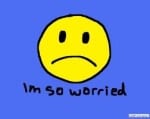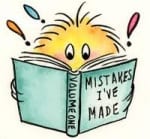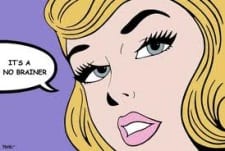 Let’s face it, there’s nothing like an emotionally abusive relationship for reducing your head to mush. You have so many things to worry about, you can’t even work out where to start.
Let’s face it, there’s nothing like an emotionally abusive relationship for reducing your head to mush. You have so many things to worry about, you can’t even work out where to start.
One of the major concerns I hear is:
“I’m worried about hurting the children. (After all, they may just not have noticed they’ve been living in a war zone, giving all the minimizing and denial I’ve done. If I just keep telling them to do what I’ve NOT done, they’ll probably be fine, won’t they? And if they’re not, I’ll take that burden of guilt on board, as well.)”
I remember the trade-off I made inside my own head, as regards my daughter. Notice how nobody else was involved in this trade-off – except some mythical power that I thought I could bargain with. The trade-off went like this: “if I stay put and take enough misery and ill-treatment, I’ll somehow be able to protect my child. I may go through hell, but her world, will be as near perfect as I can possibly make it.”
Sadly, the reality was that she couldn’t help but experience what was happening in her home. She was affected, of course: she had a relationship with her emotionally abusive father, did she not? And she told herself one, or several, stories about that relationship which – in the end – she didn’t share with me, for her own good reasons.
Certainly, she learned from my mistakes, but not necessarily the lesson I gave her through my words. Things she apparently learned include:
 “It will be different for me, because I’m not her.” (Yes, and no. You and I are both old enough to know that we unconsciously take on board a load of things we have no wish to learn – otherwise, why on earth, would so many of us marry our own emotionally abusive father, or mother?)
“It will be different for me, because I’m not her.” (Yes, and no. You and I are both old enough to know that we unconsciously take on board a load of things we have no wish to learn – otherwise, why on earth, would so many of us marry our own emotionally abusive father, or mother?)- “I’ll be okay because I’ll have a relationship with a different kind of person.” (Sadly, that qualifies as the Same Old Dross, Different Wrapper route to relationship misery. What we are running from, we run straight into… Not least, because we are looking in the wrong direction.
- “The burden of her life, her self-sacrifice, and her attachment to me weigh heavily on my shoulders.”
- Whatever I do, I don’t want to repeat her life.”
I won’t speak for you, but here’s what I found: When you do too much, and give too much, even when you do it as selflessly as possible, you still hope for a return. You don’t demand it, but you hope for it
For a lot of us, things don’t quite work out as planned. Abusive partners, and ex-partners, meddle. They make it their business to drive a wedge between you and your children, if at all possible.
When that happens, we have to be very, very careful what we make that mean. What an emotionally abusive man wants us to make it mean is that he was the better, more lovable partner, while we’re failures – as mothers, partners, and human beings.
Does it mean that?
In his venom-riddled brain it does. A child who has fallen under his influence may well parrot that kind of idea, too.
Does that make it true?
Your choice. You can make it mean what you will.
But when you ask yourself who was really there for that child, you know the answer. You know:
 Who put in the time
Who put in the time- Who put in the love, consistently
- who was there to listen
- who really focused on that child’s happiness, and best interests
So, why would your child suddenly embrace Daddy Wonderful?
It happens.
Children have their own needs and reasons. In the end, no matter how much you have cared, and given, you cannot control their feelings, and reactions. They have their own lessons to learn, in their own way. Much as you may want to protect them, you can’t. All you can do is do your best, and accept that they have to go off and learn in their own way.
Which brings us back to you. You’ve been so busy focusing on them that you have neglected yourself. Don’t ever underestimate the damage self-neglect does.
It’s like putting yourself on a starvation diet, indefinitely. At first, you may feel a bit hungry, but you see benefits: you become fashionably thin. And then, gradually, the lack of adequate nutrition erodes your health and well-being. But because it’s gradual, you don’t register what’s going on. You just feel weaker, and more exhausted, and demotivated.
When you starve, nobody benefits.
You do far better for yourself – and you teach your children a far better lesson – when you teach by example.
You owe it to your children to show yourself, also, kindness and love.

Annie Kaszina, international Emotional Abuse Recovery specialist and award-winning author of 3 books designed to help women recognise and heal from toxic relationships so that they can build healthy, lasting relationships with the perfect partner for them, blogs about all aspects of abuse, understanding Narcissists and how to avoid them and building strong self-worth. To receive Annie’s blog direct to your Inbox just leave your details here.
The 5 Simple Steps to Healing from Narcissistic Abuse
Over the next 5 days, I'll send you some lessons and tips that I've found have really helped women to heal from narcissistic abuse. Starting with the basics.


